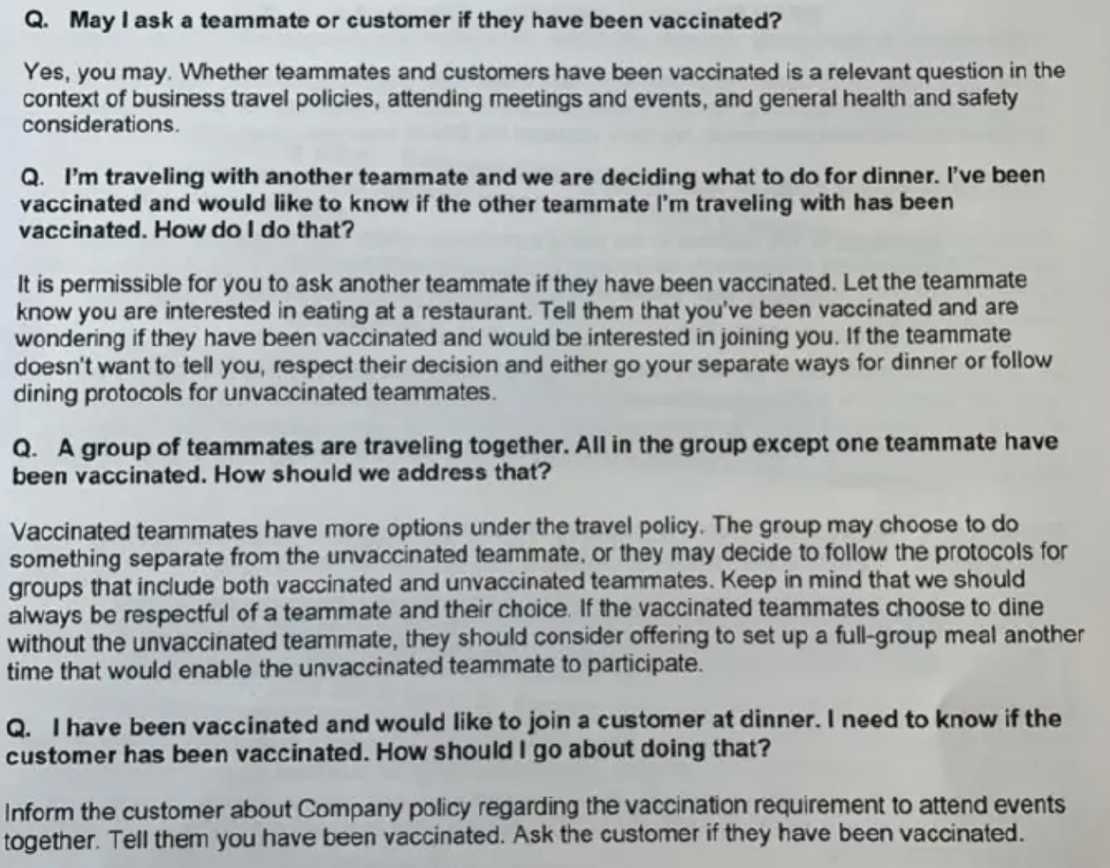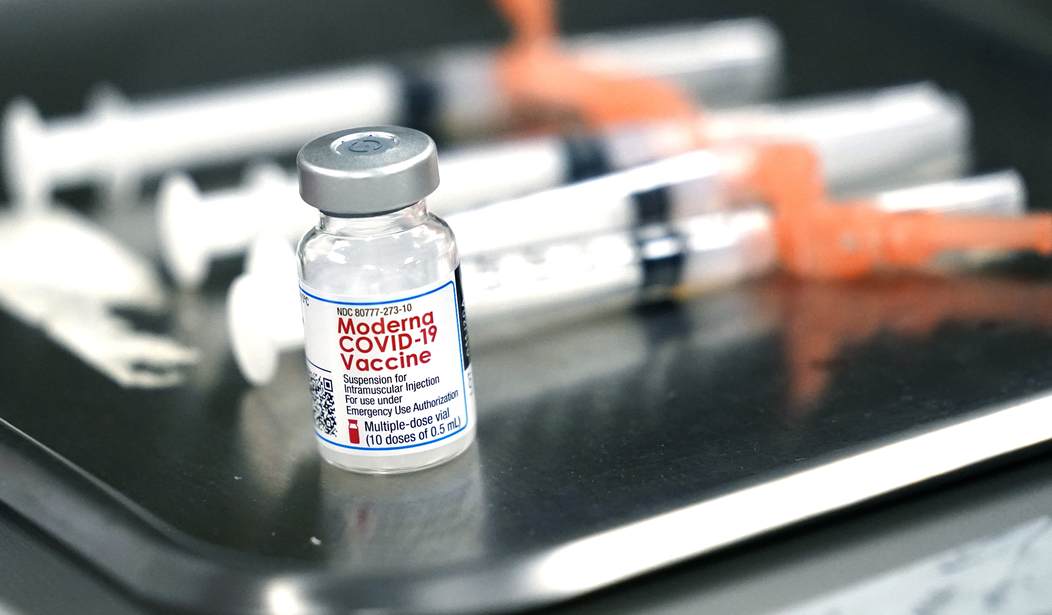An update to Bridgestone Americas, Inc’s corporate travel policy dated April 4, 2021, is an example of how employers may leverage their influence over individuals to make the COVID-19 vaccination necessary, even if they do not mandate it. The new policy applies to all employees who travel or meet with customers, but the implications are inescapable. There will be two classes of employees for the foreseeable future: those who have received the vaccine and those who have not. The introduction to the policy update states that explicitly. According to internal documents provided to PJ Media by a Bridgestone employee:
Below is a summary of key updates to the policy’s protocols, which now differentiate between fully vaccinated teammates and partially vaccinated or unvaccinated teammates. Also included is a helpful Q&A to assist you in having conversations with other teammates and customers about their vaccination status.
Many corporations have put travel safeguards or prohibitions in place during the pandemic. Most employers prioritize the health and safety of their employees for business continuity and employee relations purposes. However, if an employee’s job requires travel and he or she has an ethical or medical concern regarding receiving the COVID-19 vaccine, the new Bridgestone policy will identify that employee as unvaccinated. This status will be evident in internal company systems and the behaviors required based on their vaccination status.
First, the company is offering a $100 “Vaccine Support Payment.” Other companies have decided to do this, but Bridgestone will be tracking that information in Workday, their enterprise management system. If employees do not apply for the payment, they must report their vaccine status to the Human Resources Business Partner, who will enter it into the system. According to the policy, employees may be asked to present their government-issued COVID-19 vaccination record as evidence of complete vaccination.

Under HIPAA, vaccination status is considered protected health information according to Abbye Alexander, JD, Partner, Kaufman Dolowich & Voluck, Orlando:
Under HIPAA, immunization records are protected health information, Alexander notes. Therefore, whether an employee has received a COVID-19 vaccine may be disclosed only by a healthcare provider if the employee has furnished the provider with their written authorization.
“Employers may ask their employees whether they have received the vaccine, but they may only seek information from the employee’s medical provider with written authorization from the employee,” Alexander explains. “Once this information is obtained, it may not be disclosed by the employer without the employee’s consent.”
Alexander notes that Equal Employment Opportunity Commission (EEOC) guidance states employers may require employees to provide proof that he or she received a COVID-19 vaccine. However, disclosure of information reflecting a disability could implicate the Americans with Disabilities Act, she says.
It is unclear from the policy which management staff would have access to the employees’ vaccination disclosures, though, given the travel policy requirements, managers and human resources would need to know employees’ vaccination statuses to monitor compliance. It is rather astounding that Bridgestone is not managing the vaccine payment through a health and wellness provider or their health insurance company. Either of these would put a solid wall between the company and the employee’s protected health information, which, during the 15 years I spent in HR, was always the preferred situation.
A recent report from the Kaiser Family Foundation goes further. The key takeaways from that report question the ability of any private business or school to mandate a vaccine that the FDA has not fully approved and explains when mandates are subject to exemptions:
- Some private employers require influenza vaccines for employees in health care settings, unless prohibited by state law, and some employers and universities have already instituted mandates for COVID-19 vaccination for employees and/or students; at the same time, several states have sought to limit their ability to do so.
- More generally, however, it is unclear whether COVID-19 vaccines can be mandated while operating under an EUA, and courts have not yet ruled on this issue.
- When in place, under federal law, vaccine mandates may be subject to exemptions based on disability or religious objection.
The report also notes that states, which have clear authority to require vaccinations as they do for school attendance, do not use mandates for adult vaccinations. None have indicated an intent to change this position with the COVID-19 vaccine. Some, like New York, are letting private businesses do it for them with vaccine passports. Others, like Florida, have prohibited that practice.
Next, the policy includes a Q&A, which places the responsibility on individual employees to inquire about their teammates’ vaccination status to follow the required protocols for attending events and group dinners.

While the advice given does say an individual’s choice to be vaccinated or to not disclose that status needs to be respected, the remainder of the policy becomes a required disclosure based on an employee’s behavior in order to follow the policy.
For example, partially vaccinated and unvaccinated employees are asked not to visit multiple company facilities on a single trip to the extent possible. If they fly, they cannot return to any company facility for at least five days and possibly ten days. After five days, if they receive a negative test and are symptom-free without another contact with a COVID-19 positive individual, they may return and are required to mask.
At some point, the partially vaccinated will not be subject to this requirement, but for the foreseeable future, the unvaccinated will. Fully vaccinated employees are not subject to these restrictions unless they fail entry screenings or develop COVID-19 symptoms, a requirement for all employees. The absence of quarantine requirements indicates that Bridgestone management has confidence that vaccinated employees are well protected and not likely to be vectors of transmission.
Yet, when interacting with their teammates and customers, vaccinated employees are required to assess others’ vaccination status to follow the policy’s guidelines. For example, when dining with their unvaccinated associates, only outdoor dining is acceptable, and all attendees must wear masks. Unvaccinated and partially vaccinated employees are encouraged to get takeout or curbside meals. If they choose to eat outdoors, their group is limited to four, and social distancing must be maintained while eating together.
One question that arises is who these requirements are protecting if Bridgestone acknowledges in their quarantine requirements that an asymptomatic vaccinated individual is well protected and unlikely to transmit COVID-19. This assumption is well-grounded in the research to date on vaccinated individuals. All of the vaccines have demonstrated excellent protection against symptomatic and severe illness. Why are these employees not allowed to make their own risk determination without taking a poll of their colleagues?
There are wide variations and legitimate debates in the medical community about the need for recovered patients to vaccinate. What about those employees with a history of anaphylactic reactions, an inflammatory reaction to the COVID-19 infection, or other preexisting condition like HIV that makes vaccination contraindicated? Will they accept a finding of robust levels of antibodies in an employee who never had symptoms? Will Bridgestone allow patients to make the vaccination decision in partnership with their doctor in these circumstances? The real question is how employees who simply choose not to be vaccinated will be handled in the future.
For employees whose job requires travel and interaction with customers, restrictions like those in the Bridgestone policy will impact their ability to do their job over time if they are unwilling or unable to be vaccinated. In the meantime, having employees inquire about their colleagues’ vaccination status appears to create a peer pressure campaign when combined with differing restrictions.
When I sent these questions to Bridgestone, the company provided the following official response:
The well-being and safety of all Bridgestone employees remains the company’s most important value. With the changing environment of COVID-19, new information regarding vaccine availability, and to continue adapting our processes and protocols to meet business needs, we recently updated the company’s business travel policy.
Throughout the pandemic, our employees have done an extraordinary job working to keep each other safe, while also finding innovative ways to serve our customers and communities. Bridgestone remains steadfast in providing educational resources and support regarding the latest safety protocols, as well as information about the COVID-19 vaccine from the Centers for Disease Control (CDC), so employees can make informed decisions.
This updated policy is intended to maintain the safety of our employees, customers and the public as our highest priority while our employees are traveling on company business, and Bridgestone remains committed to this effort.
Bridgestone’s commitment to employee safety is commendable. However, after talking to medical providers throughout the Southeast, there are many different vaccination and treatment perspectives. Some are having tremendous success in early outpatient treatment. Others express caution about vaccinating those with active immunity.
While they are willing to speak privately, they refuse to speak publicly or on the record because they have seen the treatment of dissident voices throughout the pandemic. The most recent example is YouTube deleting a video of Governor Ron DeSantis speaking with a panel of highly regarded medical professionals. At least, they were highly regarded until they raised objections to lockdowns and masks. Many also read and agree with research not widely communicated or acknowledged by the CDC that influences their decision-making process.
Bridgestone is walking headlong into these disputes within the medical community by requiring protected health information to be tracked and creating policies that differentiate employees based on that information. The company will also have some employees who will never be vaccinated for health reasons they are not required to disclose. Or personal reasons that may include religious objections.
By the time the company navigates these issues, the vaccination status of employees who travel will be widely known due to the updated policy requirements. Whether or not it is intentional, Bridgestone is creating two classes of employees with their policy updates.










Join the conversation as a VIP Member